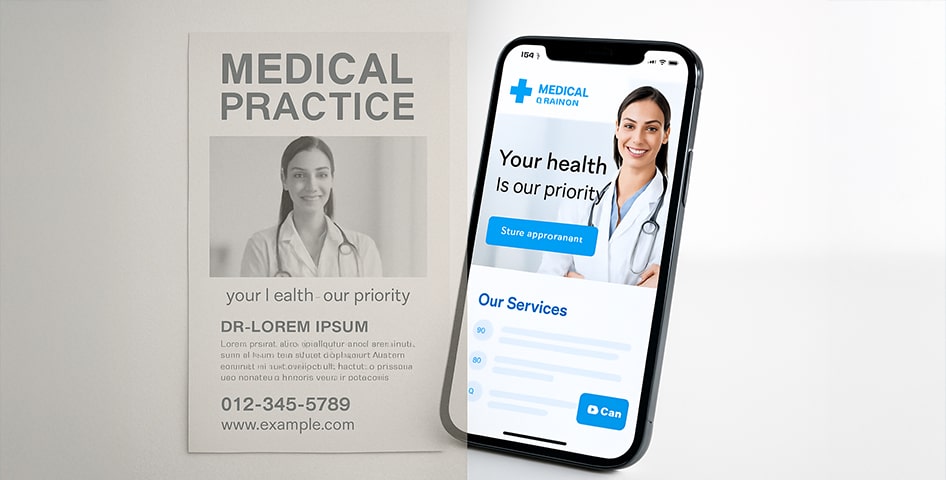The healthcare landscape in 2025 is defined by digital transformation. Patients are empowered, informed, and increasingly reliant on online channels to find, evaluate, and engage with medical practices. For any clinic or healthcare provider, simply offering excellent care is no longer enough; you need a robust, modern approach to marketing for medical practices that meets patients where they are—online.
This guide will equip you with the essential strategies and tactical insights to navigate the evolving digital healthcare marketing environment of 2025. We'll delve into the power of SEO for medical businesses, innovative clinic marketing tactics, and how integrating these elements can significantly boost your patient acquisition, enhance your reputation, and secure your practice's long-term success.
The Digital Imperative: Why Traditional Marketing Falls Short
The days of relying solely on referrals, print ads, or static billboards are rapidly fading. In 2025, patients expect digital convenience, personalized information, and seamless online interactions. This fundamental shift means that medical practices must pivot to sophisticated digital healthcare marketing strategies that:
- Prioritize Online Visibility: If your practice isn't easily found in search results, you're invisible to a significant portion of potential patients.
- Build Digital Trust: Patients are seeking highly credible information and trustworthy providers online. Your digital presence must reflect your clinical excellence and integrity.
- Offer Seamless Experience: From booking appointments online to accessing patient education, digital tools must simplify the patient journey.
- Compete Effectively: The digital healthcare market is saturated. Smart marketing allows you to stand out from competitors and capture market share.
Why Your Medical Practice Needs a Digital-First Approach:
- Patient Behavior Shift: Over 70% of patients use search engines before booking an appointment, and a significant portion use mobile devices.
- E-E-A-T Demands: Google heavily emphasizes Expertise, Experience, Authoritativeness, and Trustworthiness (E-E-A-T) for medical content, requiring a strategic approach to online credibility.
- Personalization Expectation: Patients expect tailored experiences and information, driving the need for data-driven marketing.
Cutting-Edge Marketing Strategies for Medical Practices in 2025
1. Dominant SEO for Medical Businesses
Search Engine Optimization (SEO) is the cornerstone of effective marketing for medical practices in 2025. It ensures your practice is visible when patients actively search for your services.
- Hyper-Local SEO: For any physical clinic, dominating local search is paramount. This involves meticulous optimization of your Google Business Profile (GBP) with accurate Name, Address, Phone (NAP), categories, services, and high-quality photos. Actively manage Q&A and post regular updates. For more detailed insights, see our guide on healthcare local SEO.
- E-E-A-T Driven Content Strategy: All medical content on your website must be accurate, expert-authored, and provide deep value. This includes detailed physician bios, comprehensive service pages, and educational blog posts that answer patient questions (e.g., "Symptoms of [condition] and when to see a doctor"). This is central to effective medical website SEO.
- High-Intent Keyword Targeting: Focus on long-tail, conversational keywords that reflect specific patient needs (e.g., "pediatric urgent care open now," "best dermatologist for acne scars [city]," "cost of [procedure] near me").
- Technical SEO Excellence: Your website must be fast, mobile-friendly, secure (HTTPS), and have clear navigation. Implement schema markup to help search engines understand your content and display rich snippets (like review stars or FAQs) in search results.
2. Precision-Targeted Digital Advertising
Paid advertising remains a crucial component of clinic marketing, offering immediate visibility and targeted reach.
- PPC (Pay-Per-Click) Campaigns: Invest in Google Ads to target patients with high commercial intent. Bid on keywords indicating readiness to book (e.g., "book [specialty] appointment," "clinic near me for [service]").
- Social Media Advertising: Leverage platforms like Facebook, Instagram, and TikTok for targeted campaigns. Utilize lookalike audiences (based on your existing patient list), interest-based targeting, and geographic fencing to reach relevant demographics. Showcase patient success stories (with consent) and educational videos.
- Retargeting: Re-engage website visitors who didn't convert immediately with tailored ads. This is a powerful conversion optimization tactic.
- Programmatic Advertising: For larger practices or specific B2B outreach (e.g., to other healthcare professionals), explore programmatic platforms to reach highly specific physician segments or hospital networks.

3. Patient-Centric Content & Experience
Marketing for medical practices in 2025 must prioritize the patient's journey and build trust through valuable content.
- Patient Education Hubs: Create a robust content library on your website featuring articles, infographics, and videos that explain conditions, treatments, and preventive care in easy-to-understand language. This positions your practice as a trusted resource.
- Video Marketing: Embrace video for virtual tours of your clinic, "meet the doctor" introductions, procedure explanations, and genuine patient testimonials. Video enhances engagement and builds personal connection.
- Online Appointment Booking: Implement a seamless, 24/7 online booking system on your website. This convenience reduces administrative burden and increases patient conversions. Our digital design and web development services can integrate this.
- Interactive Tools: Consider symptom checkers, online assessment quizzes, or personalized health planners (ensuring HIPAA compliance) to engage patients and capture leads.
- Telehealth Promotion: Integrate and promote your telehealth services through your website, ads, and social media, highlighting convenience and accessibility.
4. Robust Reputation Management & Social Proof
In healthcare, your online reputation is a primary driver of patient choice.
- Proactive Review Generation: Implement automated systems (via email or SMS) to politely request reviews from satisfied patients on Google, Healthgrades, Zocdoc, and other relevant platforms.
- Consistent Review Response: Respond professionally and empathetically to all reviews, positive and negative. This demonstrates your commitment to patient care and impacts your local SEO.
- Showcase Testimonials: Feature glowing patient testimonials and case studies prominently on your website, social media, and marketing materials. Authenticity is key.
- Social Listening: Monitor social media mentions and online conversations about your practice and specialty to engage directly and manage your brand narrative.
5. Automated Communication & Patient Retention
Smarter clinic marketing extends beyond acquisition to nurturing existing patients and driving retention.
- CRM (Customer Relationship Management) Integration: Centralize patient data to enable personalized communication and targeted outreach. Our custom integrations ensure seamless data flow.
- Automated Email & SMS Marketing:
- Welcome Series: For new patients, an automated sequence introduces your practice and highlights key services.
- Appointment Reminders: Automated reminders reduce no-shows.
- Post-Visit Follow-ups: Send aftercare instructions, request reviews, and suggest follow-up appointments or complementary services.
- Recall Campaigns: Nudge patients due for routine check-ups or preventive screenings.
- Educational Campaigns: Deliver personalized health tips or information relevant to a patient's conditions. This is a cornerstone of effective email marketing.
- Loyalty Programs: Implement programs that reward patient loyalty and encourage repeat visits or referrals.

The Aesthetix Advantage: Your Partner in Medical Practice Marketing
Navigating the complexities of marketing for medical practices in 2025—from ever-evolving digital channels to stringent regulations—requires specialized expertise and a relentless focus on ROI. For busy practice managers and healthcare professionals, managing this intricate landscape can be overwhelming.
This is where a specialized partner like Aesthetix Media becomes invaluable. We combine elite human-level strategic thinking with deep industry insight, enabling us to build comprehensive digital healthcare marketingengines. Our approach is bold, confident, and unapologetically revenue-first, ensuring every marketing effort directly translates into tangible patient acquisition and sustainable growth. We offer a full spectrum of solutionstailored to your practice's needs, whether you're a small medspa or a medium-large medspa.
Don't let your medical practice fall behind. It's time to invest in a marketing strategy as advanced and effective as the care you provide.
Ready to transform your marketing for medical practices and achieve unparalleled growth? Book a Strategy Session with Aesthetix Media today to uncover a customized, revenue-driven marketing plan for your practice. It's time to stop guessing and start dominating.
FAQ
Q1: What is marketing for medical practices in 2025?
A1: Marketing for medical practices in 2025 is a holistic, digital-first approach focused on increasing online visibility, building trust and authority, and attracting new patients through strategic use of SEO, digital advertising, patient-centric content, robust reputation management, and automated communication.
Q2: How has digital healthcare marketing changed most significantly in 2025?
A2: Digital healthcare marketing in 2025 has shifted to emphasize hyper-personalization powered by AI and data, the critical importance of E-E-A-T, seamless omnichannel patient experiences (including telehealth integration), and stringent privacy-first data handling due to evolving regulations.
Q3: Why is SEO for medical businesses crucial for growth?
A3: SEO for medical businesses is crucial because it ensures your practice appears prominently when patients search for health information or providers. High rankings lead to increased organic traffic, enhanced credibility, a stronger competitive edge, and a sustainable source of new patient acquisitions.
Q4: What are the most effective clinic marketing strategies for patient acquisition?
A4: The most effective clinic marketing strategies for patient acquisition include dominating local SEO, precision-targeted PPC and social media advertising, offering compelling lead magnets and introductory offers, and providing a seamless online booking experience supported by automated lead nurturing.
Q5: What role does patient experience play in marketing for medical practices?
A5: Patient experience is paramount. Marketing should highlight your commitment to patient satisfaction, convenience, and personalized care. A positive online experience (fast website, easy booking, valuable content) and excellent in-clinic service lead to positive reviews and referrals, which are powerful marketing assets.
Q6: How can AI and data analytics enhance digital healthcare marketing in 2025?
A6: AI and data analytics enhance digital healthcare marketing by enabling hyper-personalization of content and offers, predicting patient needs and behaviors, automating administrative tasks (like chatbots), optimizing ad targeting for higher ROI, and providing deeper insights into campaign performance and patient journeys.
Q7: What are the key elements of a "patient-centric" approach in medical practice marketing?
A7: A patient-centric approach involves creating educational content that addresses patient pain points, offering convenient online scheduling and communication, providing clear and transparent information, actively soliciting and responding to feedback, and personalizing interactions based on individual patient data and preferences.
Q8: How important is reputation management in the overall marketing for medical practices strategy?
A8: Reputation management is extremely important. Positive online reviews and testimonials significantly influence patient decisions and local SEO rankings. Actively generating, monitoring, and responding to reviews builds trust, enhances credibility, and distinguishes your practice from competitors, making it a powerful marketing asset.






















































